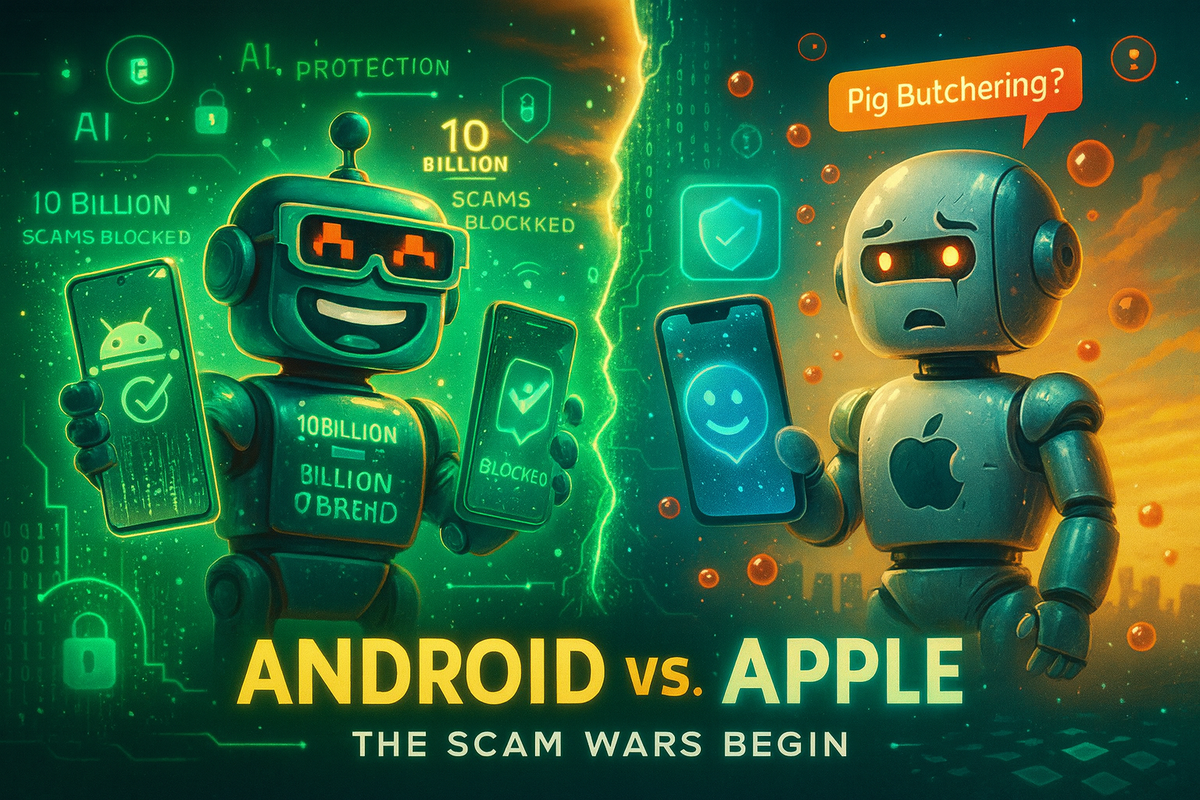Google’s New Security Report: “Android Safe, iPhone … Less So”
Google’s latest security blog claims Android beats iPhone at stopping scams — but beneath the “independent studies” and AI buzzwords lies a masterclass in self-promotion.

Move over, Cybersecurity Awareness Month — Google would like to make you aware of something far more important: that Android is definitely better than iPhone at stopping scams. How do we know? Because Google paid for the studies that say so.
In a self-congratulatory symphony of “independent” reports, today’s post on Google’s Security Blog claims that Android users are safer, smarter, and possibly more morally upright than iPhone owners. According to the blog, Android “protects you from over 10 billion malicious calls and messages every month” — which sounds impressive until you realize it’s mostly just blocking the same extended car warranty robocall that’s been haunting you since 2016.
But that’s not all. This post, written by three people with titles so long they must be paid by the hyphen, also lets us know that Android’s AI-driven safeguards are “proactive, multi-layered, and always improving.” Which is exactly how every villain in a sci-fi movie describes their robot army five minutes before it turns on humanity.
The $400 Billion Scams Problem (Or, How to Set the Stage for a Victory Lap)
The post begins with an alarming statistic: “fraudsters have used advanced AI tools to create more convincing schemes, resulting in over $400 billion in stolen funds globally.”
It’s a convenient number that paints the world as one giant phishing attempt — and sets up Google as our digital savior. Because when the scam apocalypse hits, who better to save us than the company whose business model is literally built on knowing everything about you?
According to Google, Android is now so advanced that it can “anticipate and block scams before they reach you.” Translation: your phone is reading your messages, listening to your calls, and running its little AI brain to decide if Grandma’s voicemail about Thanksgiving might actually be a phishing attempt.
Honestly, it’s nice to know that while we sleep, Google AI is awake, caffeinated, and judging our inboxes.
“Independent” Studies That Look Suspiciously Like Sponsored Homework
Then comes the data dump. Google cites not one but two “independent” studies — from Counterpoint Research and Leviathan Security Group — both of which, shockingly, conclude that Android is the best at everything.
Counterpoint found that Android has AI-powered protections in ten categories, while iOS only has two. The visual (which you just know was made in Google Slides) probably shows a proud green bar towering over a sad gray Apple logo.
Leviathan Security Group (no, not a Bond villain organization, though it sounds like one) also “conducted a funded evaluation” — meaning, yes, Google paid them — and concluded that the Pixel 10 Pro provides “the highest level of default scam and fraud protection.”
Let’s pause on that phrase: “funded evaluation.” That’s corporate for “we sponsored the study, but the scientists pinky-promised it was objective.” It’s like when your friend insists their new boyfriend is amazing because he wrote his own Yelp review.
Android vs. iPhone: The Scam Wars Go Quantitative
In the survey Google also commissioned, Android users were apparently 58% more likely to say they hadn’t received scam texts in the past week. Pixel users were 96% more likely to report zero scam texts — which raises a question: are scammers just polite enough to skip Pixel owners, or are Pixel users simply too bored to check their spam folders?
The blog gleefully notes that “iPhone users were 136% more likely to say they had received a heavy volume of scam messages.” And “150% more likely to say their device was not effective at all in stopping mobile fraud.”
These are the kind of numbers that look impressive until you remember they came from a Google/YouGov survey. Which is basically like Coke hiring Pepsi’s intern to confirm Coke tastes better.
Also, if you’re wondering who these 5,000 respondents were — 5,100 across the U.S., India, and Brazil — congratulations, you’ve found the only humans alive who answered an Android survey instead of just closing the tab.
The Glorious Features You Definitely Needed a Press Release For
The second half of the post reads like an overcaffeinated infomercial:
- Google Messages now filters spam using “on-device AI,” which “analyzes messages for patterns of conversational scams (like pig butchering).”
Translation: Google taught your phone to recognize emotional manipulation faster than your therapist can. - Phone by Google can now answer calls for you using Call Screen, identify fraudsters, and issue “real-time warnings for suspicious conversational patterns.”
Translation: Your phone now plays detective and therapist — and will interrupt you mid-sentence if it thinks you’re being catfished.* - Play Protect and Safe Browsing now use LLMs (that’s Large Language Models) for “enhanced protection.”
Translation: Even Chrome is now powered by the same type of AI that writes LinkedIn think pieces about synergy.
By the end, the post sounds less like a security announcement and more like an audition tape for Black Mirror: Season 9 – The Phone That Knew Too Much.
Google, Hero of Privacy (Just Don’t Read the Fine Print)
The tone throughout is a masterclass in corporate self-heroism. “With Android,” it concludes, “you can trust that you have intelligent, multi-layered protection against scams working for you.”
That’s right — trust Google, the company that once leaked 500,000 users’ data from Google+, tracked your location even when you turned it off, and occasionally sends you targeted ads based on something you whispered in your sleep.
It’s not that Android’s protections aren’t real — they are. But the way Google frames it, you’d think Android personally saved humanity from a Nigerian prince.
The Real Scam Was the Marketing All Along
Let’s be honest: Android’s anti-scam campaign isn’t really about protecting users — it’s about protecting market share. Pixel sales are up, Apple’s privacy ads are biting, and Google needed a narrative that doesn’t involve “We’re trying to sell you ads between scam calls.”
So they gave us the “Scam Report.” They hired Leviathan (great name) and Counterpoint (great invoice printer). They compared their own AI to Apple’s, declared victory, and wrapped it in the comforting blanket of “safety.”
Because nothing says secure like an 800-word blog post assuring you that the world’s largest data broker is totally, definitely, 100% on your side.
Final Thought
So yes — congratulations, Android users. Your phones are now officially smarter than your grandparents when it comes to spotting scams. But before you celebrate, remember: the only entity with more data on you than a scammer is Google itself.
In the end, maybe the safest way to avoid digital fraud is simple:
Just stop answering your phone.




